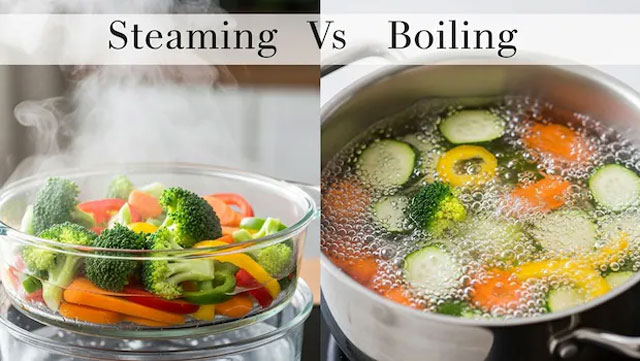Daijiworld Media Network – New Delhi
New Delhi, Nov 1: It’s a question most home cooks have asked themselves at least once — should you boil your vegetables or steam them? Though it may sound like a small kitchen choice, this decision can make a big difference to how your vegetables look, taste, and nourish your body.
Both boiling and steaming are simple, oil-free, and healthy cooking techniques, but they behave quite differently once the heat rises. While boiling offers comfort and ease, steaming promises freshness and nutrition.

What happens when you steam vegetables
When you steam vegetables, they are cooked gently by vapour, not by direct contact with water. This method preserves most of the nutrients, especially Vitamin C and B-complex vitamins, which are water-soluble. Steamed vegetables often look brighter and taste fresher — greens stay vivid, carrots turn richer in colour, and broccoli retains its crunch.
“Steaming allows the natural sweetness and texture of vegetables to shine,” say chefs. A few drops of lemon juice or herbs added to the steaming water can subtly boost aroma and flavour.
What happens when you boil vegetables
Boiling, the more traditional method, involves submerging vegetables in hot water until tender. It’s convenient and perfect for starchy vegetables like potatoes or beetroot. However, many nutrients escape into the boiling water — unless reused in soups or curries, they’re lost.
Boiled vegetables tend to become softer and sometimes bland due to the breakdown of cell walls. Yet, for mashed dishes, soups, or baby food, boiling remains a preferred choice.
Steaming vs boiling at a glance
|
Aspect
|
Steaming
|
Boiling
|
|
Nutrient Retention
|
High
|
Lower
|
|
Texture
|
Crisp, colourful
|
Soft, sometimes mushy
|
|
Flavour
|
Natural, slightly sweet
|
Mild, needs seasoning
|
|
Best For
|
Broccoli, carrots, beans
|
Potatoes, beetroot, peas
|
Which method is healthier?
Experts say steaming has a slight edge. It preserves digestion-friendly compounds in vegetables and retains vitamins and antioxidants better. Ayurveda also calls steaming a sattvic method — one that maintains prana or life energy in food.
According to Dr Ritika Samaddar, Regional Head of Dietetics at Max Healthcare, “Steaming is one of the healthiest cooking methods. It retains vitamins and minerals without oil, making it ideal for those managing weight, diabetes, or heart health.”
Mistakes to avoid
While steaming:
• Do not oversteam; vegetables should be tender-crisp.
• Avoid crowding the steamer.
• Cut vegetables evenly for uniform cooking.
• Add herbs or salt to the water for flavour.
While Boiling:
• Do not overboil; most vegetables need just 3–6 minutes.
• Always salt the water lightly.
• Use leftover water in soups or curries.
• Add vegetables only after the water boils.
Smart tip: Combine both methods
If you can’t choose, combine! Parboil dense vegetables like carrots, then finish them with a quick steam. Or boil potatoes while steaming greens on top — a time-saving and nutritious combo.
The bottom line
If your goal is to keep the natural colour, flavour, and nutrients intact, steaming wins. But for comfort foods like dal, soups, or mashed veggies, boiling still has its place.
So next time you stand in your kitchen, remember — steaming keeps the freshness alive, while boiling brings warmth and comfort. Both can make your plate healthy and wholesome in their own way.